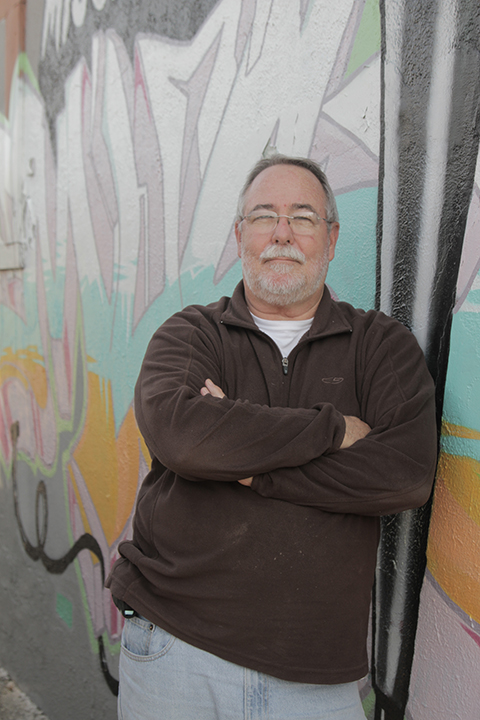
Travis Taylor | Lariat Photo Editor
Reporter
Hesitant to be pegged as a theologian, Dr. Jimmy Dorrell, a part-time lecturer at George W. Truett Theological Seminary, said his ideology stems from an urgency to maintain a practical Christian faith and not from a desire to engage in theological discussion.
“I’ve always hated intelligent, fluffy theology,” he said. “If it’s true, I have to learn how to live out of it.”
Dorrell is pastor of Church Under the Bridge and director of Mission Waco. He teaches seminary classes at Baylor about the relationships between churches and their surrounding communities.
“It’s not about individuals, but rather about how we can bring help and healing to a broken up neighborhood,” he said.
The idea of “Christian individualism” is pervasive in society, Dorrell said. Much of his guiding theology tends to contradict this type of modern Christianity, which is often focused on bettering individual circumstances, rather than tending to communities in need.
“Theology about rebuilding cities is very strong in the Bible, and it comes more out of practical brokenness than it does out of theological intelligence,” he said.
These ideas attracted Shannon Williams, Truett Seminary alumna and member of Church Under the Bridge, to a position at Mission Waco. Williams, who has known Dorrell for 13 years, said she discovered the possibility of urban missions after sitting under Dorrell at Truett before graduating in 2003.
“I’ve wanted to do missions for most of my life, but everything clicked when I did Jimmy’s class,” she said. “There are mission opportunities all over the world, but there is also so much to do here.”
Dorrell said after years of pursuing the American middle-class idea of denominational religion, he became a man who sought after “genuineness.”
“I basically grew up a Pharisee,” he said. “I hated the duplicity of life — say one thing and do another.”
Having grown up in the 60s, a time racked with racial tension, Dorrell said humility has played a major role in shaping the way he raised his family and the direction of his ministry.
“I grew up prejudiced, in the world of the 60s where everything was hate and division,” he said. “I had to come face-to-face with outward religion and figure out what it means to love a city like God loves a city.”
Dorrell said his ministry is also propelled by incarnational theology, which supports the belief that God took on the form of a man and physically lived on Earth. This theology, coupled with newfound humility and an appreciation for equality, is the reason Dorrell decided to move his family into a poverty-stricken Waco neighborhood, rather than continue to live in a middle-class area.
“I love the message translation that says, ‘God became a man and moved into the neighborhood,’” Dorrell said. “God moved into a neighborhood and hung out with the lepers and prostitutes. We’re supposed to live like Christ.”
Williams said she also follows this theology and made the same decision to move into the neighborhood in which she also ministers. Dorrell’s goal is not to transform the areas in which he works into upper-class regions, but rather to approach these communities with a “systemic mindset” of restoration.
“There’s a focus on everything from housing to economic development to individual betterment,” he said. “I just want to give everyone in these areas a Biblical understanding of how God cares for their lives.”
Dorrell said he is “disappointed” with Western Christianity and how seemingly ineffective it is in communities that need it most.
“That’s why Church Under the Bridge is so important to me,” he said. “I’m at a church under a bridge where it’s black, white, brown, Catholics and Presbyterians, ex-offenders and schizophrenics. We don’t sit around talking about Baptist polity like I did as a kid. We talk about issues of grace for the person who came out of jail, who shot somebody.”
Jeter Basden, professor of religion and director of ministry guidance at Baylor, said Dorrell taught him to think about the church in terms of “primary” and “secondary customers,” with those who have never heard the Gospel being primary and church attendees being secondary.
“Many churches, I think, see themselves as being there to serve those who come to them,” he said. “He’s just helped me see how Christians need to impact the world in ways that are not necessarily self-serving to the strength of the mission.”
Basden said after returning to Waco from a mission trip with Dorrell to Mexico City, he saw how practical theology can help build a community while instilling in the people of that community the truth of Christ.
“I’ve seen him involved with a variety of the ministries at Mission Waco, and now I’m trying to lead the folks I’m around to have that kind of focus,” he said.
Dorrell said his work as a pastor and director of a nonprofit organization are also fueled by this practical Christianity.
Systematic theology, a contrast to practical theology, focuses on putting “frameworks” around Christian ideas, Dorrell said.
“With systematic theology, you can learn the information and make a 100 on the test,” he said. “With practical theology, you’re asking, ‘How do I take what God is saying through the Scriptures in life form?’”
Dorrell said although he feels strongly about a greater need for practical Christianity than intellectual theology, his views are not intended to degrade the work of theologians.
“We need scholars, but scholarship without faith is empty,” he said.






